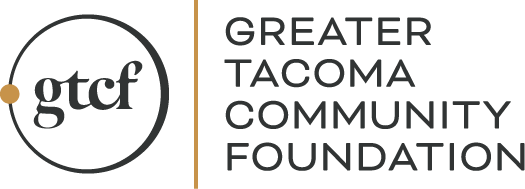
Community
12
Youth Leaders Central To Ending Youth & Young Adult Homelessness in Pierce County
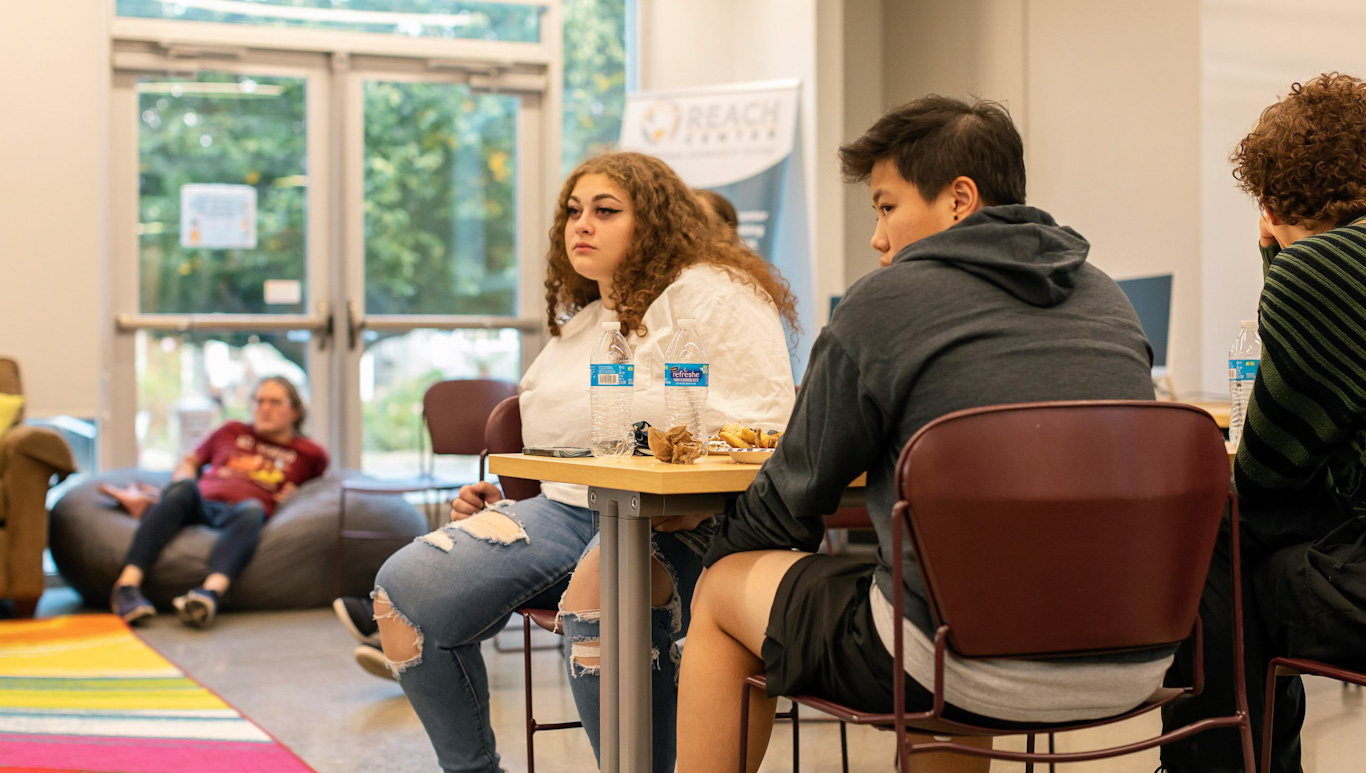
Pierce County Youth Action Board Members gather for a weekly meeting at REACH Center
It’s a scenario that happens all too often. A young person is kicked out of their home, or leaves on their own after a family conflict. They reach out to friends for help, and stay on one couch for a few days, then another and another, and so on. Wanting to figure out a more stable situation, they seek out services, but don’t qualify for help from organizations because they aren’t yet literally homeless.
REACH Center, in Tacoma’s Hilltop neighborhood, is one place these young people can get support before they end up unsheltered on the streets. Devon Isakson, Interim REACH Director, explains there are a lot of young people in that position, “Statistically speaking we serve just as many ‘in eminent risk of’ as we do ‘literally homeless’.”
At the REACH Center, young people on the brink of homelessness can get help with housing, employment, education, and advocacy.
“It’s finding a way that our systems can work together where when a young person is experiencing homelessness we can get them out of that situation quickly.”
REACH Center consulted with a group of teens and young adults with current or lived experience with homelessness to inform these preventative services. The group is called the Pierce County Youth Action Board. Funding from Pierce County supports both the Youth Action Board and the ability to serve youth ‘in eminent risk of’ homelessness.
At a recent weekly meeting, one Pierce County Youth Action Board member named Isabel shared, “I was homeless for about two and a half years on and off. Being in that position and knowing how it felt for me, personally all the stress and everything, I want to advocate for other people who are still going through that and help them get out of it.”
In addition to consulting on services, funding, and hiring decisions at REACH, Youth Action Board Members play a critical role in Pierce County’s Anchor Communities Initiative, a partnership with A Way Home Washington. Launched in 2019, the initiative aims to end youth and young adult homelessness in counties across the state.
The initiative sees the key to ending youth homelessness as reaching ‘Functional Zero’. Selena, one of the Youth Action Board’s Coordinators explained, “It’s finding a way that our systems can work together where when a young person is experiencing homelessness we can get them out of that situation quickly.”
“Those generational issues of people not having equal access to economic resources and security to keep people safe in their family has historically been divided along racial lines.”
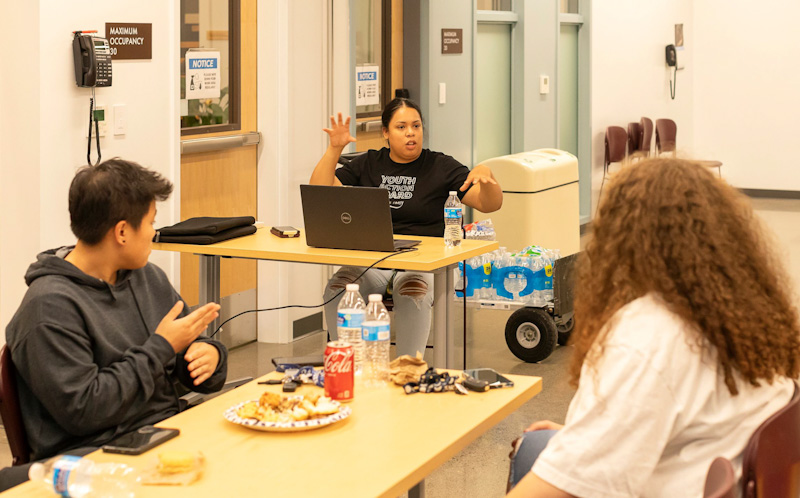
Pierce County Youth Action Board Members gather for a weekly meeting at REACH Center
Currently, there are more than 800 young people aged 12-24 experiencing homelessness in Pierce County. Pierce County’s Homeless Management Information System shows 70% identified as Youth of Color and 21% identified as LGBTQ+. Those numbers are disproportionate to Pierce County’s overall population demographics, meaning that unhoused youth are more likely to be Youth of Color and LGBTQ+.
Youth Action Board member Rosemary explained how system barriers rooted in racism contribute to the issue, “Generational Trauma and Generational Wealth definitely play a role. You probably won’t be homeless if you have family to back you up and help you out with rent once in a while or give you a couch to stay on. Those generational issues of people not having equal access to economic resources and security to keep people safe in their family has historically been divided along racial lines.”
Discrimination and bias can also be a barrier to unhoused youth receiving support services. Several Youth Action Board members described experiences from their lives and from other youth. They said they experienced verbal abuse, having their beds kicked to be woken up at a shelter, identities not being recognized or respected, and even being denied services at times. One board member said, “Abusive home situations, or not being accepted is often what leads to them leaving, so when you go to get help and the same stuff is happening there…that’s horrible.”
Youth Action Board members say there are programs and services that are making a positive difference. One example is Arlington Drive Apartments, designed and operated by Tacoma Housing Authority. Arlington Drive is a 58-unit apartment rental facility for young people ages 18-24 who are experiencing homelessness or transitioning from the foster care system. Rent is determined on an income-based sliding scale, providing an opportunity for young people to build rental history. On-site case management services, mental health support, substance use disorder counseling, and life skills training are provided by YMCA of Greater Seattle.
Shantell, a Youth Action Board member who lived at Arlington Drive, explained why mental health support and other training programs help youth, “Young people are carrying all their experiences with them. From when I was homeless – and on top of that disabled – it destroyed me. You know, so, mental health support is needed.”
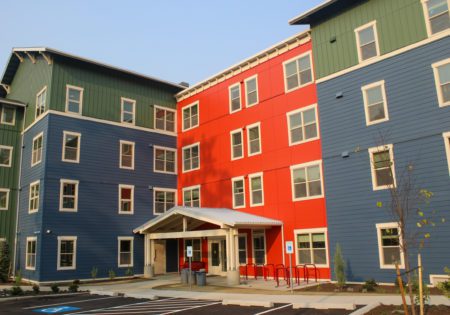
Arlington Drive Apartments, designed and operated by Tacoma Housing Authority
Residents moving on from Arlington Drive also receive a rental voucher to help as a stepping stone in the transition process into their next home.
Oasis Youth Center was another organization that received high praise for being a place youth know they will always feel welcomed and respected while receiving valuable services and support. Oasis provides a number of programs and services for LGBTQ+ youth, such as Project 13, a nationally recognized after-school program for youth ages 11-14, where they can look forward to weekly activities and discussions around positive self-identity, community support, and critical thinking skills around consent, healthy relationships, and healthy decision-making.
Another unique program that Oasis offers is dedicated for Queer, Trans, and Intersex People of Color (QTIPOC) to come together for community, support, and fun activities while having a safe space to discuss the unique intersectionality and experiences that QTIPOC folks live. QTIPOC occurs every week. Youth Action Board member Rosemary said, “It would be great if they could have more drop-in centers like Oasis in locations across Pierce County.”
Interim REACH Director Devon Isakson agreed, “We really need funding for capacity building. We need more youth service providers in locations across Pierce County. One diversion program, one housing facility, one youth shelter-all in Tacoma – is just not enough services to meet the need.”
“It’s more than just ‘listening’ to young people, it’s putting them at the forefront of the conversation.”
The Youth Action Board is playing an important role in getting more funding to help address these needs. Board members are currently working in collaboration with the Pierce County Continuum of Care Oversight Committee (CoC), a group that provides guidance and input on the implementation of the Plan to End Homelessness, to complete the youth narrative portion of an application for federal funding from the Department of Housing and Urban Development’s Youth Homelessness Demonstration Project.
“Our young people know what they need and can provide deeper context to data that really helps pinpoint where changes to the system are needed.”
Pierce County applied for funding through the Youth Homelessness Demonstration Project in each of the last five years but didn’t get funded. Pierce County received lower scores on the Youth Narrative portion of the application. Pierce County CoC Vice-Chair and Director of the Campaign to End Youth & Young Adult Homelessness, Rodney Robinson explains the difference this year. “It’s more than just ‘listening’ to young people, it’s putting them at the forefront of the conversation.” GTCF is a funding sponsor of the Campaign to End Youth & Young Adult Homelessness.
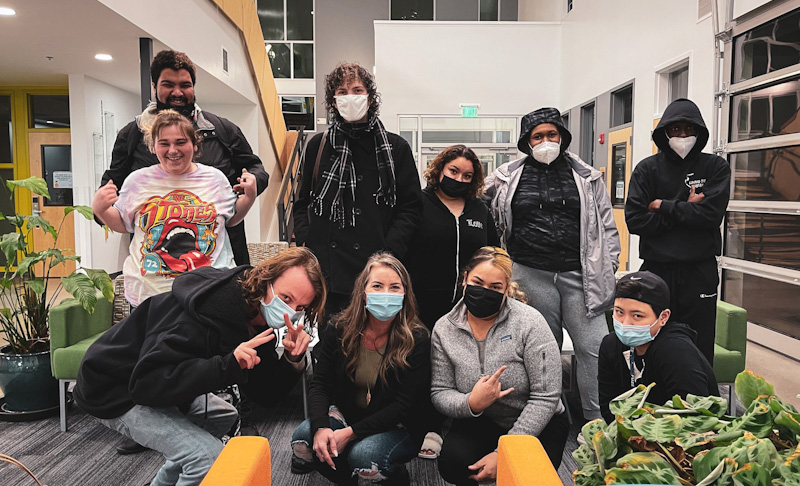
Members of the Pierce County Youth Action Board with Devon Isakson at a weekly gathering at REACH Center
Rodney described how young people have been engaged throughout the process this year, and how the CoC and Youth Action Board have an agreement that supports board members to come to meetings regularly and participate as equal partners in the process, “Our young people know what they need and can provide deeper context to data that really helps pinpoint where changes to the system are needed.”
“Being in that position and knowing how it felt for me, personally all the stress and everything, I want to advocate for other people who are still going through that and help them get out of it.”
Back at REACH Center, Devon also emphasized the importance of going beyond “listening to youth” to compensating them for their expertise and creating career pathways as well. “It’s not only about elevating youth voice, but also creating employment opportunities that help them enter into the social services space and provide a steady income while doing the work they really want to do of helping others.”
Contact the GTCF Philanthropy Team to learn more about how to support the continuum of housing supports for youth and young adult in Pierce County.
Further Resources
Definitions of Homelessness – U.S. Department of Housing and Urban Development
Youth & Young Adult Homelessness FAQ – Away Home Washington & Anchor Communities Initiative
REACH Center
Arlington Drive Youth Campus
Oasis Youth Center
